Guess Which Major Bank Loses The Most From Brexit?
Submitted by Tyler D.
04/14/2016 15:55 -0400
Banks have been lobbying intensively against Brexit. Among those leading the charge is Goldman Sachs. For three years, the bank’s executives have publicly warned about the downsides of leaving the EU... and now we know why (hint - it's not concern for the common man).
As The Wall Street Journal reports, about a decade ago, Goldman launched project “Armada,” a plan for a hulking European headquarters on the site of an old telephone exchange in London.
Unbundling this kind of structure will be expensive and time-consuming, lawyers and bankers say. Goldman is mapping out which jobs might be hit by a loss of this passport, or the right to sell services across the EU, while scoping out European countries where it has existing banking licenses and infrastructure that could quickly be scaled up, according to a person familiar with the matter. Goldman also has a banking license in Germany, for instance.
In the event that this passport was lost, derivative and currency trading with EU counterparts would likely be hit hard. A large portion of euro currency and securities trading takes place through London, outside the eurozone. In the event of Brexit, EU authorities may well press for the trading of euro securities to be cleared within the trading bloc, bankers say.
Today, Goldman services Middle Eastern and African customers in London too. Some 90% of its 6,000 staff based in Europe are in London. Europe, the Middle East and Africa accounted for 27% of Goldman’s $33.8 billion of net revenue in 2015.
But faced with the prospect of spending billions of dollars to rejig their operations, banks have been lobbying intensively against Brexit.
Among those leading the charge is Goldman Sachs. For three years, the bank’s executives have publicly warned about the downsides of leaving the EU.
The bank has donated around $700,000 to a group which is lobbying against Brexit, according to a person familiar with the matter. Its executives have signed warning letters to major British newspapers. An EU flag currently flutters above its London headquarters. Last fall the bank organized events on the sidelines of opposition Labour and governing Conservative party conferences to debate the role of the U.K. in Europe.
During the annual meeting of the World Economic Forum in January in Switzerland, Gary Cohn, president of Goldman Sachs, reiterated a well-rehearsed warning. “It is imperative for the U.K. to keep the financial-services industry in the U.K.,” he said, adding, “I don’t know what would replace that industry.”
The advocacy by U.S. banks has antagonized those, often at smaller brokers or hedge funds, who say the U.K. financial sector would be less heavily regulated outside the EU and thrive.
“Why would the Americans be interested in what is good for the U.K.?” said Howard Shore, executive chairman of Shore Capital Group PLC, an investment group.
“They are interested in what is good for their bank.”
Shocking!! So next time you read a research piece proclaiming the catastrophe Brexit would be, consider the above... because fo rnmow it's all about the "undecided"
Deutsche Bank Confirms Silver Market Manipulation In Legal Settlement, Agrees To Expose Other Banks
Tyler D.
04/14/2016 17:19 -0400
Back in July of 2014, we reported that in an attempt to obtain if not compensation, then at least confirmation of bank manipulation in the precious metals industry, a group of silver bullion banks including Deutsche Bank, Bank of Nova Scotia and HSBC (later UBS was also added to the defendants) were accused of manipulating prices in the multi-billion dollar market.
The lawsuit, which was originally filed in a New York district court by veteran litigator J. Scott Nicholson, a resident of Washington DC, alleged that the banks, which oversee the century-old silver fix manipulated the physical and COMEX futures market since January 2007. The lawsuit subsequently received class-action status. It was the first case to target the silver fix.
Many expected that this case would never go anywhere and that the defendant banks would stonewall indefinitely: after all their legal budgets were far greater than the plaintiffs.
Which is why we were surprised to read overnight that not only has this lawsuit against precious metals manipulation not been swept away, but that the lead defendant, troulbed German bank Deutsche Bank agreed to settle the litigation over allegations it illegally conspired with Bank of Nova Scotia and HSBC Holdings Plc to fix silver prices at the expense of investors, Reuters reported citing a court filing by law firm Lowey.
Terms were not disclosed, but the accord will include a monetary payment by the German bank.
It goes without saying, that there would have been neither a settlement nor a payment if the banks had done nothing wrong.
According to Reuters, Deutsche Bank has signed a binding settlement term sheet, and is negotiating a formal settlement agreement to be submitted for approval by U.S. District Judge Valerie Caproni, who oversees the litigation. A Deutsche Bank spokeswoman declined to comment. Lawyers for the investors did not immediately respond to requests for comment.
As noted above, investors had accused Deutsche Bank, HSBC and ScotiaBank of abusing their power as three of the world's largest silver bullion banks to dictate the price of silver through a secret, once-a-day meeting known as the Silver Fix.
None of this will come as a big surprise to readers, most of whom have been aware that this took place for years.
But wait there's more.
In a curious twist, the settlement letter reveals a stunning development, namely that the former members of the manipulation cartel have turned on each other. To wit:
“In addition to valuable monetary consideration, Deutsche Bank has also agreed to provide cooperation to plaintiffs, including the production of instant messages, and other electronic communications, as part of the settlement. In Plaintiff’s estimation, the cooperation to be provided by Deutsche Bank will substantially assist Plaintiffs in the prosecution of their claims against the non-settling defendants.”
The full shocking letter can be read here:
Since this is just one of many lawsuits filed over the past two years in Manhattan federal court in which investors accused banks of conspiring to rig rates or prices in financial and commodities markets, we expect that now that DB has "turned" that much more curious information about precious metals rigging will emerge, and will confirm what the "bugs" had said all along: that the precious metals market has been rigged all along.
Finally, we'll just remind readers that the US commodity "regulator", the CFTC in 2013 closed its five year investigation concerning allegations that the biggest bullion banks manipulate silver markets and prices. It proudly reported in September 2013 that it found no evidence of wrongdoing and dropped the probe. This is what it said:
The Commodity Futures Trading Commission (CFTC or Commission) Division of Enforcement has closed the investigation that was publicly confirmed in September 2008 concerning silver markets. The Division of Enforcement is not recommending charges to the Commission in that investigation. For law enforcement and confidentiality reasons, the CFTC only rarely comments publicly on whether it has opened or closed any particular investigation. Nonetheless, given that this particular investigation was confirmed in September 2008, the CFTC deemed it appropriate to inform the public that the investigation is no longer ongoing. Based upon the law and evidence as they exist at this time, there is not a viable basis to bring an enforcement action with respect to any firm or its employees related to our investigation of silver markets.
In light of this confirmation that the CFTC's probe was "lacking" perhaps it is time for the so-called regulators who at the time was headed by ex-Goldmanite Gary Gensler (and assisted by "revolving door" expert and HFT lobby sellout Bart Chilton) to reopen its investigation?
Jueves 14/04/16 Sentimiento del consumidor
60 mensajes
• Página 4 de 4 • 1, 2, 3, 4
Re: Jueves 14/04/16 Sentimiento del consumidor
"Someone Is Going To Be Very Wrong"
04/14/2016 17:20 -0400
Submitted by Lance Roberts
Despite all of the cheering by the mainstream media that the economy is “doing great” and “no recession” in sight, a look at small business sales trends and retail sales certainly suggest a very different story.
We recently saw the “retail sales figures” for March which were, to say the least, disappointing. I say this because these numbers expose the flawed economic theories of the mainstream proletariat that the abnormally warm winter and exceptionally low energy prices should boost spending due to the relative savings.
Retail-Sales-2-041416
Despite ongoing prognostications of a “recession nowhere in sight,” it should be remembered that consumption drives roughly 2/3rds of the economy. Of that, retail sales comprise about 40%. Therefore, the ongoing deterioration in retail sales should not be readily dismissed.
More troubling is the rise in consumer credit relative to the decline in retail sales as shown below.
Retail-Sales-Credit-DPI-041416
What this suggests is that consumers are struggling just to maintain their current living standard and have resorted to credit to make ends meet. Since the amount of credit extended to any one individual is finite, it should not surprise anyone that such a surge in credit as retail sales decline has been a precursor to previous recessions.
We can also see the problem with retail sales by looking at the National Federation of Independent Business Small Business Survey. The survey ask respondents about last quarter’s real sales versus next quarters expectations.
NFIB-Retail-Sales-041416
Not surprisingly, expectations are always much more optimistic than reality turns out to be. However, what is important is that both actual and expected retail sales are declining from levels that have historically been indicative of a recession.
Today, consumer credit has surged, without a relevant pickup in spending, to more than 26% of DPI. Given that it took a surge of $11 Trillion in credit to offset a decline in economic growth from 8% in the 70’s to an average of 4% during the 80’s and 90’s, it is unlikely that consumers can repeat that “hat trick” again.
A Different Valuation Measure
I recently discussed the effect of stock valuations on future long-term returns. To wit:
“I believe in long-term investing. I do think that you should buy quality investments and hold them long-term. However, what Wall Street, and many financial advisors miss, is the most important point of this argument which is ‘at the right valuation.’
Valuation, what you pay for an investment, is the single biggest determinant of future returns.
According to Dr. Roberts Shiller’s data, the Cyclically Adjusted P/E Ratio is currently hovering around 24x earnings. It is here that the problem for long-term investors currently resides. The chart below shows the average real (inflation-adjusted) 20-year returns of a $1000 investment made when P/E ratios first hit 20x or 10x earnings.”
20-Yr-Returns-Start-20x-10x-Earnings-031616
As you can see, valuations make a huge difference.
However, not surprisingly, shortly after I published the article I received numerous emails citing low interest rates, accounting rule changes, and debt-funded buybacks all as reasons why “this time is different.” While such could possibly be true, it is worth noting that each of these supports are both artificial and finite in nature.
Currently, the aging U.S. economy, where productivity has exploded, wage growth has remained weak and whose households are weighed down by surging debt, remains mired in a slow-growth funk. This slow-growth funk has, in turn, put a powerful shareholder base to work increasing pressure on corporate managers not to invest, and to recycle capital into dividends and buybacks instead which has led to a record level of corporate debt.
These actions, as suggested above, are limited in nature. For a while, these devices kept ROE elevated, however, the efficacy of those actions has now been reached.
Corporate-Profits-ROE-041416
Importantly, profit margins and ROE are reasonably well-correlated which is what creates the perception that profit margins mean-revert. However, ROE is a better indicator of what is happening inside of corporate balance sheets more so than just profit margins. The current collapse in ROE is likely sending a much darker message about corporate health than profit margins currently.
Corporate-Profits-Earnings-PerShare-Deviation-041416-2
While the decline in reported earnings, which are subject to accounting manipulations and share buybacks have indeed declined, it is not nearly to the extent as shown by both ROE and Corporate Profits After Tax.
While traditional P/E ratios have surged to 24x earnings recently, Price to Corporate Profits Per Share (P/CP) has exploded to the second highest level on record.
Corporate-Profits-P-CP-Ratio-041416
Historically speaking, it is unlikely that with reported earnings early in the reversion process that we will see a sharp recovery in the second half of the year as currently expected by the majority of mainstream analysts. The suggests that as long as the Fed remains active in supporting asset prices, the deviation between fundamentals and fantasy will continue to stretch to extremes. The end result of which has never “been different this time.”
Did The Fed Kill The Bear?
Speaking of the Fed, the surge in the market over the last couple of days have many scratching their heads despite deteriorating economics, weak earnings and poor geopolitical news. Of course, given the series of emergency Fed meetings, the markets are currently beating on a much longer time frame to the next, if ever, rate hike.
Of course, what is most interesting is what investor sentiment, both individual and professional, has recently accomplished.
AAII-IINV-NetBullish-Sentiment-041416
Accordingly, the chart above, investor sentiment suggests the market has just completed a recessionary “bear market” with virtually no substantial losses. This can also be seen by looking at just the amount of “bearish” sentiment in the market as well.
AAII-IINV-Bearish-Sentiment-041416
As noted, the 13-week moving average of bearish sentiment has reached levels currently that are more normally associated with bottoms to corrective processes as seen in 2010 and 2011 when the Federal Reserve intervened with QE2 and Operation Twist. What is interesting is that all of the support during the current correction has been strictly “verbal” with no real change to market liquidity or accommodation.
“Make me promises, just tell me no lies.”
However, while this surge in bearish sentiment has occurred, which normally denotes a substantial level of fear by investors, there has been no substantial change to actual allocations.
AAII-Allocation-Survey-041416
While stock allocations have fallen modestly, cash and bond allocations have barely budged. This is a far different story than was seen during previous major and intermediate-term corrections in the market.
This suggests, is that while investors are worried about the markets and their investments, they are too afraid to actually make changes to their portfolio as long as Central Banks continue to bail out the markets.
What is clear is that the Federal Reserve has gained control of asset markets by gaining control over investor behavior.
“Are you afraid of a market crash? Yes. Are you doing anything about it? No.”
Again, it’s back to fundamentals versus expectations. Someone is going to be very wrong.
Just some things to think about.
In Its Second Attempt At Going Public, BATS Prices $253 Million IPO At $19/Share
Submitted by Tyler D.
04/14/2016 - 17:35
It's time for try number two. Moments ago BATS announced that it has just priced its second attempt at going public by pricing its (second) initial public offering at a price to the public of $19.00 per share (this time the high end of the range). The size of the offering has been increased from the initially announced 11,200,000 shares of common stock to 13,300,000 shares of common stock.
Former Fed Advisor Asks "Has The Fed Bankrupted The Nation"
Submitted by Tyler D.
04/14/2016 - 18:10
In 1977, the total indebtedness of U.S. government, corporate and household borrowers was $323 billion. By 1985, that figure had grown to $7 trillion. Volcker left the Fed in August of 1987 after handing the reins over to Alan Greenspan. By year’s end 2015, U.S. indebtedness had swelled to $45.2 trillion. Tack on financials, which few do, and it’s $64.5 trillion and unabashedly growing. We are a nation transformed. What has today’s vast store of debt purchased? Certainly not freedom.
The Government Breaks Through On Deficit Reduction, Will Lower Social Security Payments
Submitted by Tyler D.
04/14/2016 - 19:30
It's well known that the US government is broke, and if it used accrual accounting instead of cash accounting it would be staggeringly worse, as all of its future liabilities would be shown. Knowing this, government officials are working tirelessly (and even on some weekends, much to the dismay of Jack Lew) to find ways to reduce spending. Thanks to all of those long nights scrubbing the budget line by line, a way to save costs has finally been found...
Japanic Buying
Submitted by Tyler D.
04/14/2016 - 20:24
Because - absent any data whatsoever and nothing but a headline about Aso and Lew having a cozy chat about FX manipulation and The BoJ's "receptiveness" to buying more ETFs - USDJPY spiked 30 pips at the open, and drum roll please, Nikkei 225 futures went 200 points vertical without blinking an eyelid.
Why For Japanese Traders "Every Day Is Like Being Alice In Wonderland"
Tyler D.
04/14/2016 20:30 -0400
As the world is now fully aware, The BOJ surprised markets in January when it set a –0.1% rate on some deposits that banks place at the central bank, effective from mid-February. Its move was designed to encourage banks to lend more, spurring higher spending and inflation. Things are not working so well...
And now, as The Wall Street Journal reports, some are already doubting the policy...
Trading has withered in Japan’s money markets, where big banks and others usually park their excess cash hoping to receive some interest—despite predictions from the Bank of Japan that its latest easing of monetary policy would spark more activity.
Traders have also pushed up the yen believing Japan’s central bank can’t do much more to ease policy.
“Every day is like being Alice in Wonderland,” said Tomohisa Fujiki, head of interest-rate strategy at BNP Paribas Securities Japan. “Interest-rates levels are having no effect on credit demand, the market function is declining. You can’t expect everything to go according to plan.”
“There’s no guarantee that lowering interest rates for retail and corporate borrowing would have the same effect [of preventing deflation] as it did in Europe,” said Nobuyuki Hirano, president of Mitsubishi UFJ Financial ??Group?Inc., Japan’s biggest bank, on Thursday, adding the negative-interest policy had caused households and businesses to rein in spending amid growing uncertainty over the future.
But it is the money markets that are becoming a major issue...
Money markets allow banks and other financial institutions to lend and borrow money for a period of less than a year, often not backed by collateral. If fewer banks invest cash in short-term markets, it is harder for other banks to get short-term loans to finance their operations.
One problem has been Japanese banks’ computer systems: The trade confirmation system used by money-market brokers wasn’t fully updated for negative interest rates until over a month after the BOJ rate cut. Money-market trading volumes dropped to their lowest level since at least 2011 at the end of March, according to Japan’s Money Brokers Association, down to nearly a tenth of January’s levels.
Japanese trust banks that manage cash on behalf of mutual and pension funds have in recent weeks been placing excess money on deposit at the Bank of Japan rather than into overnight money markets, where it might now attract a negative interest rate.
“If the money market dries up, if there is an event like the Lehman crisis, there won’t be the infrastructure for banks to raise capital,” said Naomi Muguruma, strategist at Mitsubishi UFJ Morgan Stanley Securities. “It could cause interest rates to rise sharply.”
Problems in the money markets have run counter to BOJ Governor Haruhiko Kuroda’s expectations: last month he said that as market players get used to negative rates, money-market trading should increase.
So - to sum up - NIRP has crushed liquidity (in all markets), sent foreign investors piling into JGBs to front-run chaotic BoJ buying, has actually discouraged risk-taking (breaking the back of Abe's crucial belief-based system of monetary policy), has strengthened the Yen (screwing the exporters), and finally - drum roll please - begun to drain money-market funds placing the entire Japanese financial system in a much more systemically-fragile state.
But apart from that - more of the same is just what the doctor ordered.
Given that Japan is now at QE22 with no signs of anything promised at all...
As Alhambra's Jeffrey Snider once wrote,
What none of those have amounted to is an actual and sustainable economic advance; NONE, no matter how you count them. In very simple fact, the idea that central banks “need” to keep doing them in continuous fashion is quite convincing that at the very least they don’t mean what central bankers think they mean, and perhaps worse that the more they are done and to greater extents the more harm that eventually befalls. It isn’t difficult to suggest and even directly observe that Japan’s economy has shrunk during the QE age, but that fact isn’t applicable to Japan alone (there are sure too many non-adjusted data points that uncomfortably assert the same for even the US). That would seem to at least offer a basis for a “deflationary mindset” no matter the actual economic effects.
This is not so much investing or even finance as it is a cult (calling it a religion or even ideology is unjustifiably too charitable). That is the usefulness of “deflationary mindset” not so much as a matter of actual economic pathology but as a built-in, squishy appeal to “we’ll get it right next time.” And there is always, always a next time which doesn’t seem to count for much inside the cult when, in fact, it is everything.
And so finally, as if you had not had enough of the farce they call Japan, we get this headline tonight:
* *BOJ SAID TO BE RECEPTIVE TO BUYING MORE ETFS: REUTERS
And scene. It really is the monetary equivalent of “the beatings will continue until morale improves.”
04/14/2016 17:20 -0400
Submitted by Lance Roberts
Despite all of the cheering by the mainstream media that the economy is “doing great” and “no recession” in sight, a look at small business sales trends and retail sales certainly suggest a very different story.
We recently saw the “retail sales figures” for March which were, to say the least, disappointing. I say this because these numbers expose the flawed economic theories of the mainstream proletariat that the abnormally warm winter and exceptionally low energy prices should boost spending due to the relative savings.
Retail-Sales-2-041416
Despite ongoing prognostications of a “recession nowhere in sight,” it should be remembered that consumption drives roughly 2/3rds of the economy. Of that, retail sales comprise about 40%. Therefore, the ongoing deterioration in retail sales should not be readily dismissed.
More troubling is the rise in consumer credit relative to the decline in retail sales as shown below.
Retail-Sales-Credit-DPI-041416
What this suggests is that consumers are struggling just to maintain their current living standard and have resorted to credit to make ends meet. Since the amount of credit extended to any one individual is finite, it should not surprise anyone that such a surge in credit as retail sales decline has been a precursor to previous recessions.
We can also see the problem with retail sales by looking at the National Federation of Independent Business Small Business Survey. The survey ask respondents about last quarter’s real sales versus next quarters expectations.
NFIB-Retail-Sales-041416
Not surprisingly, expectations are always much more optimistic than reality turns out to be. However, what is important is that both actual and expected retail sales are declining from levels that have historically been indicative of a recession.
Today, consumer credit has surged, without a relevant pickup in spending, to more than 26% of DPI. Given that it took a surge of $11 Trillion in credit to offset a decline in economic growth from 8% in the 70’s to an average of 4% during the 80’s and 90’s, it is unlikely that consumers can repeat that “hat trick” again.
A Different Valuation Measure
I recently discussed the effect of stock valuations on future long-term returns. To wit:
“I believe in long-term investing. I do think that you should buy quality investments and hold them long-term. However, what Wall Street, and many financial advisors miss, is the most important point of this argument which is ‘at the right valuation.’
Valuation, what you pay for an investment, is the single biggest determinant of future returns.
According to Dr. Roberts Shiller’s data, the Cyclically Adjusted P/E Ratio is currently hovering around 24x earnings. It is here that the problem for long-term investors currently resides. The chart below shows the average real (inflation-adjusted) 20-year returns of a $1000 investment made when P/E ratios first hit 20x or 10x earnings.”
20-Yr-Returns-Start-20x-10x-Earnings-031616
As you can see, valuations make a huge difference.
However, not surprisingly, shortly after I published the article I received numerous emails citing low interest rates, accounting rule changes, and debt-funded buybacks all as reasons why “this time is different.” While such could possibly be true, it is worth noting that each of these supports are both artificial and finite in nature.
Currently, the aging U.S. economy, where productivity has exploded, wage growth has remained weak and whose households are weighed down by surging debt, remains mired in a slow-growth funk. This slow-growth funk has, in turn, put a powerful shareholder base to work increasing pressure on corporate managers not to invest, and to recycle capital into dividends and buybacks instead which has led to a record level of corporate debt.
These actions, as suggested above, are limited in nature. For a while, these devices kept ROE elevated, however, the efficacy of those actions has now been reached.
Corporate-Profits-ROE-041416
Importantly, profit margins and ROE are reasonably well-correlated which is what creates the perception that profit margins mean-revert. However, ROE is a better indicator of what is happening inside of corporate balance sheets more so than just profit margins. The current collapse in ROE is likely sending a much darker message about corporate health than profit margins currently.
Corporate-Profits-Earnings-PerShare-Deviation-041416-2
While the decline in reported earnings, which are subject to accounting manipulations and share buybacks have indeed declined, it is not nearly to the extent as shown by both ROE and Corporate Profits After Tax.
While traditional P/E ratios have surged to 24x earnings recently, Price to Corporate Profits Per Share (P/CP) has exploded to the second highest level on record.
Corporate-Profits-P-CP-Ratio-041416
Historically speaking, it is unlikely that with reported earnings early in the reversion process that we will see a sharp recovery in the second half of the year as currently expected by the majority of mainstream analysts. The suggests that as long as the Fed remains active in supporting asset prices, the deviation between fundamentals and fantasy will continue to stretch to extremes. The end result of which has never “been different this time.”
Did The Fed Kill The Bear?
Speaking of the Fed, the surge in the market over the last couple of days have many scratching their heads despite deteriorating economics, weak earnings and poor geopolitical news. Of course, given the series of emergency Fed meetings, the markets are currently beating on a much longer time frame to the next, if ever, rate hike.
Of course, what is most interesting is what investor sentiment, both individual and professional, has recently accomplished.
AAII-IINV-NetBullish-Sentiment-041416
Accordingly, the chart above, investor sentiment suggests the market has just completed a recessionary “bear market” with virtually no substantial losses. This can also be seen by looking at just the amount of “bearish” sentiment in the market as well.
AAII-IINV-Bearish-Sentiment-041416
As noted, the 13-week moving average of bearish sentiment has reached levels currently that are more normally associated with bottoms to corrective processes as seen in 2010 and 2011 when the Federal Reserve intervened with QE2 and Operation Twist. What is interesting is that all of the support during the current correction has been strictly “verbal” with no real change to market liquidity or accommodation.
“Make me promises, just tell me no lies.”
However, while this surge in bearish sentiment has occurred, which normally denotes a substantial level of fear by investors, there has been no substantial change to actual allocations.
AAII-Allocation-Survey-041416
While stock allocations have fallen modestly, cash and bond allocations have barely budged. This is a far different story than was seen during previous major and intermediate-term corrections in the market.
This suggests, is that while investors are worried about the markets and their investments, they are too afraid to actually make changes to their portfolio as long as Central Banks continue to bail out the markets.
What is clear is that the Federal Reserve has gained control of asset markets by gaining control over investor behavior.
“Are you afraid of a market crash? Yes. Are you doing anything about it? No.”
Again, it’s back to fundamentals versus expectations. Someone is going to be very wrong.
Just some things to think about.
In Its Second Attempt At Going Public, BATS Prices $253 Million IPO At $19/Share
Submitted by Tyler D.
04/14/2016 - 17:35
It's time for try number two. Moments ago BATS announced that it has just priced its second attempt at going public by pricing its (second) initial public offering at a price to the public of $19.00 per share (this time the high end of the range). The size of the offering has been increased from the initially announced 11,200,000 shares of common stock to 13,300,000 shares of common stock.
Former Fed Advisor Asks "Has The Fed Bankrupted The Nation"
Submitted by Tyler D.
04/14/2016 - 18:10
In 1977, the total indebtedness of U.S. government, corporate and household borrowers was $323 billion. By 1985, that figure had grown to $7 trillion. Volcker left the Fed in August of 1987 after handing the reins over to Alan Greenspan. By year’s end 2015, U.S. indebtedness had swelled to $45.2 trillion. Tack on financials, which few do, and it’s $64.5 trillion and unabashedly growing. We are a nation transformed. What has today’s vast store of debt purchased? Certainly not freedom.
The Government Breaks Through On Deficit Reduction, Will Lower Social Security Payments
Submitted by Tyler D.
04/14/2016 - 19:30
It's well known that the US government is broke, and if it used accrual accounting instead of cash accounting it would be staggeringly worse, as all of its future liabilities would be shown. Knowing this, government officials are working tirelessly (and even on some weekends, much to the dismay of Jack Lew) to find ways to reduce spending. Thanks to all of those long nights scrubbing the budget line by line, a way to save costs has finally been found...
Japanic Buying
Submitted by Tyler D.
04/14/2016 - 20:24
Because - absent any data whatsoever and nothing but a headline about Aso and Lew having a cozy chat about FX manipulation and The BoJ's "receptiveness" to buying more ETFs - USDJPY spiked 30 pips at the open, and drum roll please, Nikkei 225 futures went 200 points vertical without blinking an eyelid.
Why For Japanese Traders "Every Day Is Like Being Alice In Wonderland"
Tyler D.
04/14/2016 20:30 -0400
As the world is now fully aware, The BOJ surprised markets in January when it set a –0.1% rate on some deposits that banks place at the central bank, effective from mid-February. Its move was designed to encourage banks to lend more, spurring higher spending and inflation. Things are not working so well...
And now, as The Wall Street Journal reports, some are already doubting the policy...
Trading has withered in Japan’s money markets, where big banks and others usually park their excess cash hoping to receive some interest—despite predictions from the Bank of Japan that its latest easing of monetary policy would spark more activity.
Traders have also pushed up the yen believing Japan’s central bank can’t do much more to ease policy.
“Every day is like being Alice in Wonderland,” said Tomohisa Fujiki, head of interest-rate strategy at BNP Paribas Securities Japan. “Interest-rates levels are having no effect on credit demand, the market function is declining. You can’t expect everything to go according to plan.”
“There’s no guarantee that lowering interest rates for retail and corporate borrowing would have the same effect [of preventing deflation] as it did in Europe,” said Nobuyuki Hirano, president of Mitsubishi UFJ Financial ??Group?Inc., Japan’s biggest bank, on Thursday, adding the negative-interest policy had caused households and businesses to rein in spending amid growing uncertainty over the future.
But it is the money markets that are becoming a major issue...
Money markets allow banks and other financial institutions to lend and borrow money for a period of less than a year, often not backed by collateral. If fewer banks invest cash in short-term markets, it is harder for other banks to get short-term loans to finance their operations.
One problem has been Japanese banks’ computer systems: The trade confirmation system used by money-market brokers wasn’t fully updated for negative interest rates until over a month after the BOJ rate cut. Money-market trading volumes dropped to their lowest level since at least 2011 at the end of March, according to Japan’s Money Brokers Association, down to nearly a tenth of January’s levels.
Japanese trust banks that manage cash on behalf of mutual and pension funds have in recent weeks been placing excess money on deposit at the Bank of Japan rather than into overnight money markets, where it might now attract a negative interest rate.
“If the money market dries up, if there is an event like the Lehman crisis, there won’t be the infrastructure for banks to raise capital,” said Naomi Muguruma, strategist at Mitsubishi UFJ Morgan Stanley Securities. “It could cause interest rates to rise sharply.”
Problems in the money markets have run counter to BOJ Governor Haruhiko Kuroda’s expectations: last month he said that as market players get used to negative rates, money-market trading should increase.
So - to sum up - NIRP has crushed liquidity (in all markets), sent foreign investors piling into JGBs to front-run chaotic BoJ buying, has actually discouraged risk-taking (breaking the back of Abe's crucial belief-based system of monetary policy), has strengthened the Yen (screwing the exporters), and finally - drum roll please - begun to drain money-market funds placing the entire Japanese financial system in a much more systemically-fragile state.
But apart from that - more of the same is just what the doctor ordered.
Given that Japan is now at QE22 with no signs of anything promised at all...
As Alhambra's Jeffrey Snider once wrote,
What none of those have amounted to is an actual and sustainable economic advance; NONE, no matter how you count them. In very simple fact, the idea that central banks “need” to keep doing them in continuous fashion is quite convincing that at the very least they don’t mean what central bankers think they mean, and perhaps worse that the more they are done and to greater extents the more harm that eventually befalls. It isn’t difficult to suggest and even directly observe that Japan’s economy has shrunk during the QE age, but that fact isn’t applicable to Japan alone (there are sure too many non-adjusted data points that uncomfortably assert the same for even the US). That would seem to at least offer a basis for a “deflationary mindset” no matter the actual economic effects.
This is not so much investing or even finance as it is a cult (calling it a religion or even ideology is unjustifiably too charitable). That is the usefulness of “deflationary mindset” not so much as a matter of actual economic pathology but as a built-in, squishy appeal to “we’ll get it right next time.” And there is always, always a next time which doesn’t seem to count for much inside the cult when, in fact, it is everything.
And so finally, as if you had not had enough of the farce they call Japan, we get this headline tonight:
* *BOJ SAID TO BE RECEPTIVE TO BUYING MORE ETFS: REUTERS
And scene. It really is the monetary equivalent of “the beatings will continue until morale improves.”
- Fenix
- Mensajes: 16351
- Registrado: Vie Abr 23, 2010 2:36 am
Re: Jueves 14/04/16 Sentimiento del consumidor
Deutsche Bank Admits It Rigged Gold Prices, Agrees To Expose Other Manipulators
Tyler D.
04/14/2016 12:48 -0400
Well, that didn't take long.
Earlier today when we reported the stunning news that DB has decided to "turn" against the precious metals manipulation cartel by first settling a long-running silver price fixing lawsuit which in addition to "valuable monetary consideration" said it would expose the other banks' rigging having also "agreed to provide cooperation to plaintiffs, including the production of instant messages, and other electronic communications, as part of the settlement" we said "since this is just one of many lawsuits filed over the past two years in Manhattan federal court in which investors accused banks of conspiring to rig rates or prices in financial and commodities markets, we expect that now that DB has "turned" that much more curious information about precious metals rigging will emerge, and will confirm what the "bugs" had said all along: that the precious metals market has been rigged all along."
This was confirmed moments ago when Reuters reported that Deutsche Bank has also reached a settlement in US litigation alleging the bank conspired to fix gold prices. In other words, hours after admitting it was rigging the silver market, it did the same for gold.
Some more headlines:
* Reaches settlement in U.S. litigation alleging it conspired to fix gold prices.
* Plaintiffs' lawyers, in filing, say Deutsche Bank has signed a settlement term sheet
* Plaintiffs' lawyers say are negotiating formal settlement agreement that would be presented for judge's approval later
* Plaintiffs' lawyers say settlement contemplates a monetary payment by Deutsche Bank
* Gold settlement follows similar accord involving alleged silver price-fixing that was disclosed on Wednesday
Most importantly, as the actual settlement reveals, Deutsche has agreed that in addition to once again providing "valuable monetary consideration" which will be paid into a settlement fund, that like in the silver settlement it will provide "cooperation in pursuing claims against the remaining Defendants."
And with that the floodgates open.
Here is the full settlement letter:
* * *
As a reminder, this is what we reported just hours ago on an identical settlement involving Deutsche Bank admitting to also rigging silver:
Deutsche Bank Confirms Silver Market Manipulation In Legal Settlement, Agrees To Expose Other Banks
Back in July of 2014, we reported that in an attempt to obtain if not compensation, then at least confirmation of bank manipulation in the precious metals industry, a group of silver bullion banks including Deutsche Bank, Bank of Nova Scotia and HSBC (later UBS was also added to the defendants) were accused of manipulating prices in the multi-billion dollar market.
The lawsuit, which was originally filed in a New York district court by veteran litigator J. Scott Nicholson, a resident of Washington DC, alleged that the banks, which oversee the century-old silver fix manipulated the physical and COMEX futures market since January 2007. The lawsuit subsequently received class-action status. It was the first case to target the silver fix.
Many expected that this case would never go anywhere and that the defendant banks would stonewall indefinitely: after all their legal budgets were far greater than the plaintiffs.
Which is why we were surprised to read overnight that not only has this lawsuit against precious metals manipulation not been swept away, but that the lead defendant, troulbed German bank Deutsche Bank agreed to settle the litigation over allegations it illegally conspired with Bank of Nova Scotia and HSBC Holdings Plc to fix silver prices at the expense of investors, Reuters reported citing a court filing by law firm Lowey.
Terms were not disclosed, but the accord will include a monetary payment by the German bank.
It goes without saying, that there would have been neither a settlement nor a payment if the banks had done nothing wrong.
According to Reuters, Deutsche Bank has signed a binding settlement term sheet, and is negotiating a formal settlement agreement to be submitted for approval by U.S. District Judge Valerie Caproni, who oversees the litigation. A Deutsche Bank spokeswoman declined to comment. Lawyers for the investors did not immediately respond to requests for comment.
As noted above, investors had accused Deutsche Bank, HSBC and ScotiaBank of abusing their power as three of the world's largest silver bullion banks to dictate the price of silver through a secret, once-a-day meeting known as the Silver Fix.
None of this will come as a big surprise to readers, most of whom have been aware that this took place for years.
But wait there's more.
In a curious twist, the settlement letter reveals a stunning development, namely that the former members of the manipulation cartel have turned on each other. To wit:
“In addition to valuable monetary consideration, Deutsche Bank has also agreed to provide cooperation to plaintiffs, including the production of instant messages, and other electronic communications, as part of the settlement. In Plaintiff’s estimation, the cooperation to be provided by Deutsche Bank will substantially assist Plaintiffs in the prosecution of their claims against the non-settling defendants.”
The full shocking letter can be read here:
Since this is just one of many lawsuits filed over the past two years in Manhattan federal court in which investors accused banks of conspiring to rig rates or prices in financial and commodities markets, we expect that now that DB has "turned" that much more curious information about precious metals rigging will emerge, and will confirm what the "bugs" had said all along: that the precious metals market has been rigged all along.
Finally, we'll just remind readers that the US commodity "regulator", the CFTC in 2013 closed its five year investigation concerning allegations that the biggest bullion banks manipulate silver markets and prices. It proudly reported in September 2013 that it found no evidence of wrongdoing and dropped the probe. This is what it said:
The Commodity Futures Trading Commission (CFTC or Commission) Division of Enforcement has closed the investigation that was publicly confirmed in September 2008 concerning silver markets. The Division of Enforcement is not recommending charges to the Commission in that investigation. For law enforcement and confidentiality reasons, the CFTC only rarely comments publicly on whether it has opened or closed any particular investigation. Nonetheless, given that this particular investigation was confirmed in September 2008, the CFTC deemed it appropriate to inform the public that the investigation is no longer ongoing. Based upon the law and evidence as they exist at this time, there is not a viable basis to bring an enforcement action with respect to any firm or its employees related to our investigation of silver markets.
In light of this confirmation that the CFTC's probe was "lacking" perhaps it is time for the so-called regulators who at the time was headed by ex-Goldmanite Gary Gensler (and assisted by "revolving door" expert and HFT lobby sellout Bart Chilton) to reopen its investigation?
Tyler D.
04/14/2016 12:48 -0400
Well, that didn't take long.
Earlier today when we reported the stunning news that DB has decided to "turn" against the precious metals manipulation cartel by first settling a long-running silver price fixing lawsuit which in addition to "valuable monetary consideration" said it would expose the other banks' rigging having also "agreed to provide cooperation to plaintiffs, including the production of instant messages, and other electronic communications, as part of the settlement" we said "since this is just one of many lawsuits filed over the past two years in Manhattan federal court in which investors accused banks of conspiring to rig rates or prices in financial and commodities markets, we expect that now that DB has "turned" that much more curious information about precious metals rigging will emerge, and will confirm what the "bugs" had said all along: that the precious metals market has been rigged all along."
This was confirmed moments ago when Reuters reported that Deutsche Bank has also reached a settlement in US litigation alleging the bank conspired to fix gold prices. In other words, hours after admitting it was rigging the silver market, it did the same for gold.
Some more headlines:
* Reaches settlement in U.S. litigation alleging it conspired to fix gold prices.
* Plaintiffs' lawyers, in filing, say Deutsche Bank has signed a settlement term sheet
* Plaintiffs' lawyers say are negotiating formal settlement agreement that would be presented for judge's approval later
* Plaintiffs' lawyers say settlement contemplates a monetary payment by Deutsche Bank
* Gold settlement follows similar accord involving alleged silver price-fixing that was disclosed on Wednesday
Most importantly, as the actual settlement reveals, Deutsche has agreed that in addition to once again providing "valuable monetary consideration" which will be paid into a settlement fund, that like in the silver settlement it will provide "cooperation in pursuing claims against the remaining Defendants."
And with that the floodgates open.
Here is the full settlement letter:
* * *
As a reminder, this is what we reported just hours ago on an identical settlement involving Deutsche Bank admitting to also rigging silver:
Deutsche Bank Confirms Silver Market Manipulation In Legal Settlement, Agrees To Expose Other Banks
Back in July of 2014, we reported that in an attempt to obtain if not compensation, then at least confirmation of bank manipulation in the precious metals industry, a group of silver bullion banks including Deutsche Bank, Bank of Nova Scotia and HSBC (later UBS was also added to the defendants) were accused of manipulating prices in the multi-billion dollar market.
The lawsuit, which was originally filed in a New York district court by veteran litigator J. Scott Nicholson, a resident of Washington DC, alleged that the banks, which oversee the century-old silver fix manipulated the physical and COMEX futures market since January 2007. The lawsuit subsequently received class-action status. It was the first case to target the silver fix.
Many expected that this case would never go anywhere and that the defendant banks would stonewall indefinitely: after all their legal budgets were far greater than the plaintiffs.
Which is why we were surprised to read overnight that not only has this lawsuit against precious metals manipulation not been swept away, but that the lead defendant, troulbed German bank Deutsche Bank agreed to settle the litigation over allegations it illegally conspired with Bank of Nova Scotia and HSBC Holdings Plc to fix silver prices at the expense of investors, Reuters reported citing a court filing by law firm Lowey.
Terms were not disclosed, but the accord will include a monetary payment by the German bank.
It goes without saying, that there would have been neither a settlement nor a payment if the banks had done nothing wrong.
According to Reuters, Deutsche Bank has signed a binding settlement term sheet, and is negotiating a formal settlement agreement to be submitted for approval by U.S. District Judge Valerie Caproni, who oversees the litigation. A Deutsche Bank spokeswoman declined to comment. Lawyers for the investors did not immediately respond to requests for comment.
As noted above, investors had accused Deutsche Bank, HSBC and ScotiaBank of abusing their power as three of the world's largest silver bullion banks to dictate the price of silver through a secret, once-a-day meeting known as the Silver Fix.
None of this will come as a big surprise to readers, most of whom have been aware that this took place for years.
But wait there's more.
In a curious twist, the settlement letter reveals a stunning development, namely that the former members of the manipulation cartel have turned on each other. To wit:
“In addition to valuable monetary consideration, Deutsche Bank has also agreed to provide cooperation to plaintiffs, including the production of instant messages, and other electronic communications, as part of the settlement. In Plaintiff’s estimation, the cooperation to be provided by Deutsche Bank will substantially assist Plaintiffs in the prosecution of their claims against the non-settling defendants.”
The full shocking letter can be read here:
Since this is just one of many lawsuits filed over the past two years in Manhattan federal court in which investors accused banks of conspiring to rig rates or prices in financial and commodities markets, we expect that now that DB has "turned" that much more curious information about precious metals rigging will emerge, and will confirm what the "bugs" had said all along: that the precious metals market has been rigged all along.
Finally, we'll just remind readers that the US commodity "regulator", the CFTC in 2013 closed its five year investigation concerning allegations that the biggest bullion banks manipulate silver markets and prices. It proudly reported in September 2013 that it found no evidence of wrongdoing and dropped the probe. This is what it said:
The Commodity Futures Trading Commission (CFTC or Commission) Division of Enforcement has closed the investigation that was publicly confirmed in September 2008 concerning silver markets. The Division of Enforcement is not recommending charges to the Commission in that investigation. For law enforcement and confidentiality reasons, the CFTC only rarely comments publicly on whether it has opened or closed any particular investigation. Nonetheless, given that this particular investigation was confirmed in September 2008, the CFTC deemed it appropriate to inform the public that the investigation is no longer ongoing. Based upon the law and evidence as they exist at this time, there is not a viable basis to bring an enforcement action with respect to any firm or its employees related to our investigation of silver markets.
In light of this confirmation that the CFTC's probe was "lacking" perhaps it is time for the so-called regulators who at the time was headed by ex-Goldmanite Gary Gensler (and assisted by "revolving door" expert and HFT lobby sellout Bart Chilton) to reopen its investigation?
- Fenix
- Mensajes: 16351
- Registrado: Vie Abr 23, 2010 2:36 am
Re: Jueves 14/04/16 Sentimiento del consumidor
Los gráficos del día, 
.

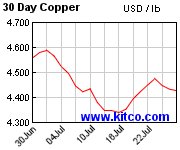
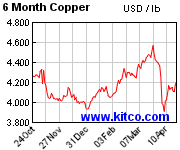
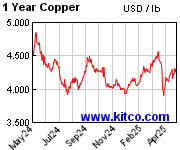
.

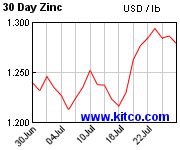
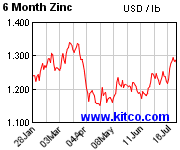
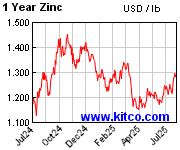
.

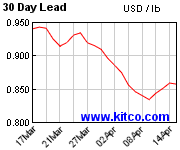
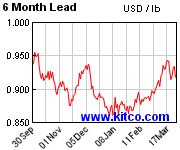
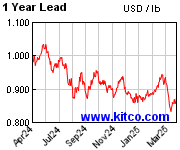
.

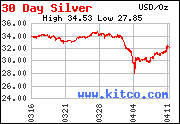
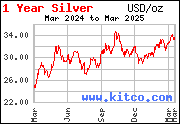
.

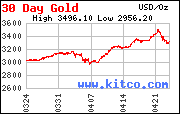
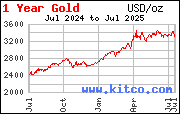
.
.




.




.




.



.



.
- Comodoro
- Mensajes: 980
- Registrado: Jue May 06, 2010 8:24 am
- Ubicación: LIMA
Re: Jueves 14/04/16 Sentimiento del consumidor
Global Dow 2365.63 -2.03 -0.09%
Japan: Nikkei 225 16848.03 -63.02 -0.37%
Stoxx Europe 600 342.06 -1.93 -0.56%
UK: FTSE 100 6332.15 -32.95 -0.52%
CURRENCIES8:22 AM EDT 4/15/2016
LAST(MID) CHANGE
Euro (EUR/USD) 1.1284 0.0016
Yen (USD/JPY) 108.87 -0.53
Pound (GBP/USD) 1.4187 0.0032
Australia $ (AUD/USD) 0.7704 0.0010
Swiss Franc (USD/CHF) 0.9672 0.0003
WSJ Dollar Index 86.30 -0.14
GOVERNMENT BONDS8:22 AM EDT 4/15/2016
PRICE CHG YIELD
U.S. 10 Year 7/32 1.770
German 10 Year 9/32 0.144
Japan 10 Year 7/32 -0.112
FUTURES8:12 AM EDT 4/15/2016
LAST CHANGE % CHG
Crude Oil 40.44 -1.06 -2.55%
Brent Crude 42.68 -1.12 -2.56%
Gold 1230.5 4.0 0.33%
Silver 16.170 -0.003 -0.02%
E-mini DJIA 17813 -29 -0.16%
E-mini S&P 500 2072.25
Japan: Nikkei 225 16848.03 -63.02 -0.37%
Stoxx Europe 600 342.06 -1.93 -0.56%
UK: FTSE 100 6332.15 -32.95 -0.52%
CURRENCIES8:22 AM EDT 4/15/2016
LAST(MID) CHANGE
Euro (EUR/USD) 1.1284 0.0016
Yen (USD/JPY) 108.87 -0.53
Pound (GBP/USD) 1.4187 0.0032
Australia $ (AUD/USD) 0.7704 0.0010
Swiss Franc (USD/CHF) 0.9672 0.0003
WSJ Dollar Index 86.30 -0.14
GOVERNMENT BONDS8:22 AM EDT 4/15/2016
PRICE CHG YIELD
U.S. 10 Year 7/32 1.770
German 10 Year 9/32 0.144
Japan 10 Year 7/32 -0.112
FUTURES8:12 AM EDT 4/15/2016
LAST CHANGE % CHG
Crude Oil 40.44 -1.06 -2.55%
Brent Crude 42.68 -1.12 -2.56%
Gold 1230.5 4.0 0.33%
Silver 16.170 -0.003 -0.02%
E-mini DJIA 17813 -29 -0.16%
E-mini S&P 500 2072.25
- admin
- Site Admin
- Mensajes: 165587
- Registrado: Mié Abr 21, 2010 9:02 pm
Re: Jueves 14/04/16 Sentimiento del consumidor
17923.31 -3.12 -0.02%
Nasdaq 4944.68 -1.21 -0.02%
S&P 500 2081.65 -1.13 -0.05%
Russell 2000 1129.50 0.91 0.08%
Global Dow 2367.14 -0.52 -0.02%
Japan: Nikkei 225 16848.03 -63.02 -0.37%
Stoxx Europe 600 342.65 -1.34 -0.39%
UK: FTSE 100 6344.62 -20.48 -0.32%
CURRENCIES11:02 AM EDT 4/15/2016
LAST(MID) CHANGE
Euro (EUR/USD) 1.1297 0.0028
Yen (USD/JPY) 108.74 -0.66
Pound (GBP/USD) 1.4179 0.0024
Australia $ (AUD/USD) 0.7705 0.0011
Swiss Franc (USD/CHF) 0.9667 -0.0002
WSJ Dollar Index 86.27 -0.18
GOVERNMENT BONDS11:02 AM EDT 4/15/2016
PRICE CHG YIELD
U.S. 10 Year 12/32 1.750
German 10 Year 14/32 0.129
Japan 10 Year 7/32 -0.112
FUTURES10:52 AM EDT 4/15/2016
LAST CHANGE % CHG
Crude Oil 40.06 -1.44 -3.47%
Brent Crude 42.41 -1.39 -3.17%
Gold 1231.4 4.9 0.40%
Silver 16.200 0.027 0.17%
E-mini DJIA 17838 -4 -0.02%
E-mini S&P 500
Nasdaq 4944.68 -1.21 -0.02%
S&P 500 2081.65 -1.13 -0.05%
Russell 2000 1129.50 0.91 0.08%
Global Dow 2367.14 -0.52 -0.02%
Japan: Nikkei 225 16848.03 -63.02 -0.37%
Stoxx Europe 600 342.65 -1.34 -0.39%
UK: FTSE 100 6344.62 -20.48 -0.32%
CURRENCIES11:02 AM EDT 4/15/2016
LAST(MID) CHANGE
Euro (EUR/USD) 1.1297 0.0028
Yen (USD/JPY) 108.74 -0.66
Pound (GBP/USD) 1.4179 0.0024
Australia $ (AUD/USD) 0.7705 0.0011
Swiss Franc (USD/CHF) 0.9667 -0.0002
WSJ Dollar Index 86.27 -0.18
GOVERNMENT BONDS11:02 AM EDT 4/15/2016
PRICE CHG YIELD
U.S. 10 Year 12/32 1.750
German 10 Year 14/32 0.129
Japan 10 Year 7/32 -0.112
FUTURES10:52 AM EDT 4/15/2016
LAST CHANGE % CHG
Crude Oil 40.06 -1.44 -3.47%
Brent Crude 42.41 -1.39 -3.17%
Gold 1231.4 4.9 0.40%
Silver 16.200 0.027 0.17%
E-mini DJIA 17838 -4 -0.02%
E-mini S&P 500
- admin
- Site Admin
- Mensajes: 165587
- Registrado: Mié Abr 21, 2010 9:02 pm
Re: Jueves 14/04/16 Sentimiento del consumidor
Producción industrial de EEUU cae más de lo esperado en marzo
WASHINGTON (Reuters) - La producción industrial de Estados Unidos cayó más de lo previsto en marzo, en el último indicio de que la expansión económica sufrió un fuerte traspié en el primer trimestre del año.
La producción de manufacturas retrocedió un 0,6 por ciento el mes pasado, luego de una revisión a la baja de una caída también del 0,6 por ciento en febrero, dijo el viernes la Reserva Federal. La producción industrial ha disminuido en seis de los últimos siete meses.
Economistas encuestados por Reuters habían estimado una caída en la producción industrial de apenas el 0,1 por ciento para marzo, frente al reporte previo de una merma del 0,5 por ciento en febrero.
(Reporte de Lucia Mutikani; Editado en español por Ana Laura Mitidieri)
WASHINGTON (Reuters) - La producción industrial de Estados Unidos cayó más de lo previsto en marzo, en el último indicio de que la expansión económica sufrió un fuerte traspié en el primer trimestre del año.
La producción de manufacturas retrocedió un 0,6 por ciento el mes pasado, luego de una revisión a la baja de una caída también del 0,6 por ciento en febrero, dijo el viernes la Reserva Federal. La producción industrial ha disminuido en seis de los últimos siete meses.
Economistas encuestados por Reuters habían estimado una caída en la producción industrial de apenas el 0,1 por ciento para marzo, frente al reporte previo de una merma del 0,5 por ciento en febrero.
(Reporte de Lucia Mutikani; Editado en español por Ana Laura Mitidieri)
- admin
- Site Admin
- Mensajes: 165587
- Registrado: Mié Abr 21, 2010 9:02 pm
Re: Jueves 14/04/16 Sentimiento del consumidor
Ganancia trimestral de Citigroup se hunde 27 pct por menores ingresos por intermediación
(Reuters) - Las ganancias trimestrales de Citigroup Inc se desplomaron un 27 por ciento, debido a una caída de sus ingresos por intermediación y por los crecientes costos relacionados con la reducción de algunos de sus negocios.
Se trata del declive más pronunciado en los beneficios entre los grandes bancos de Estados Unidos que han reportado sus resultados del primer trimestre hasta el momento, aunque las ganancias e ingresos de Citigroup (C.N: Cotización) superaron las bajas expectativas de Wall Street, ayudadas por un descenso de los gastos operacionales.
Las acciones del cuarto banco más grande de Estados Unidos por activos subían el viernes más de 2 por ciento en las operaciones previas a la apertura de Wall Street.
Los bancos a nivel mundial han tenido un difícil comienzo de año, en medio de unas tasas de interés cercanas a cero, una desaceleración en China y los bajos precios del petróleo.
Los ingresos de Citigroup de los mercados de renta fija cayeron un 11,5 por ciento a 3.090 millones de dólares, mientras que los ingresos de su banca de inversión se desplomaron un 27,2 por ciento a 875 millones de dólares.
"Si bien nuestros productos sensibles al mercado claramente sufrieron de la débil confianza de los inversores durante el trimestre, continuamos logrando avances en varias áreas clave", dijo el presidente ejecutivo del prestamista, Michael Corbat, en un comunicado.
El banco, al igual que rivales como JPMorgan Chase & Co (JPM.N: Cotización) y Bank of America Corp (BAC.N: Cotización), han recurrido a agresivos controles de costos para apuntalar las ganancias en los últimos trimestres, en momentos en que el crecimiento de los ingresos sigue siendo lento.
Citigroup, que tiene más activos en los mercados emergentes que otros bancos de Estados Unidos, ha debido salir de mercados menos rentables y recortar puestos de trabajo para ser más eficiente. La empresa registró 491 millones de dólares por cargos de "reposicionamiento".
(Reporte de Sweta Singh en Bengaluru; Editado en español por María Cecilia Mora y Rodrigo Charme)
(Reuters) - Las ganancias trimestrales de Citigroup Inc se desplomaron un 27 por ciento, debido a una caída de sus ingresos por intermediación y por los crecientes costos relacionados con la reducción de algunos de sus negocios.
Se trata del declive más pronunciado en los beneficios entre los grandes bancos de Estados Unidos que han reportado sus resultados del primer trimestre hasta el momento, aunque las ganancias e ingresos de Citigroup (C.N: Cotización) superaron las bajas expectativas de Wall Street, ayudadas por un descenso de los gastos operacionales.
Las acciones del cuarto banco más grande de Estados Unidos por activos subían el viernes más de 2 por ciento en las operaciones previas a la apertura de Wall Street.
Los bancos a nivel mundial han tenido un difícil comienzo de año, en medio de unas tasas de interés cercanas a cero, una desaceleración en China y los bajos precios del petróleo.
Los ingresos de Citigroup de los mercados de renta fija cayeron un 11,5 por ciento a 3.090 millones de dólares, mientras que los ingresos de su banca de inversión se desplomaron un 27,2 por ciento a 875 millones de dólares.
"Si bien nuestros productos sensibles al mercado claramente sufrieron de la débil confianza de los inversores durante el trimestre, continuamos logrando avances en varias áreas clave", dijo el presidente ejecutivo del prestamista, Michael Corbat, en un comunicado.
El banco, al igual que rivales como JPMorgan Chase & Co (JPM.N: Cotización) y Bank of America Corp (BAC.N: Cotización), han recurrido a agresivos controles de costos para apuntalar las ganancias en los últimos trimestres, en momentos en que el crecimiento de los ingresos sigue siendo lento.
Citigroup, que tiene más activos en los mercados emergentes que otros bancos de Estados Unidos, ha debido salir de mercados menos rentables y recortar puestos de trabajo para ser más eficiente. La empresa registró 491 millones de dólares por cargos de "reposicionamiento".
(Reporte de Sweta Singh en Bengaluru; Editado en español por María Cecilia Mora y Rodrigo Charme)
- admin
- Site Admin
- Mensajes: 165587
- Registrado: Mié Abr 21, 2010 9:02 pm
Re: Jueves 14/04/16 Sentimiento del consumidor
Cámara baja de Brasil inicia debate sobre juicio político a presidenta Rousseff
BRASILIA (Reuters) - La Cámara baja de Brasil inició el viernes un debate de tres días sobre si se debe realizar un juicio político a la presidenta Dilma Rousseff bajo cargos de manipular las cuentas presupuestarias, luego de que el Gobierno perdiera una apelación ante el máximo tribunal del país para detener el proceso.
Los congresistas a favor de la destitución de mandataria corearon "Fuera Dilma" al inicio del debate, que está previsto que concluya con una votación el domingo por la noche.
Después de haber perdido el respaldo de varios partidos aliados en las últimas semanas, se espera ampliamente que Rousseff pierda la votación del domingo, por lo que el proceso pasaría al Senado.
BRASILIA (Reuters) - La Cámara baja de Brasil inició el viernes un debate de tres días sobre si se debe realizar un juicio político a la presidenta Dilma Rousseff bajo cargos de manipular las cuentas presupuestarias, luego de que el Gobierno perdiera una apelación ante el máximo tribunal del país para detener el proceso.
Los congresistas a favor de la destitución de mandataria corearon "Fuera Dilma" al inicio del debate, que está previsto que concluya con una votación el domingo por la noche.
Después de haber perdido el respaldo de varios partidos aliados en las últimas semanas, se espera ampliamente que Rousseff pierda la votación del domingo, por lo que el proceso pasaría al Senado.
- admin
- Site Admin
- Mensajes: 165587
- Registrado: Mié Abr 21, 2010 9:02 pm
Re: Jueves 14/04/16 Sentimiento del consumidor
Argentina oficializa contratación de bancos para emisión de deuda de semana próxima
BUENOS AIRES (Reuters) - Argentina designó el viernes a Deutsche Bank, JP Morgan, HSBC, Santander, BBVA, Citigroup y UBS como colocadores conjuntos para la emisión de deuda que el país buscará concretar la semana próxima, en su retorno a los mercados globales de capital tras casi 15 años de marginación.
Las entidades elegidas por el país sudamericano para su colocación -que podría alcanzar los 15.000 millones de dólares- habían sido reportadas semanas atrás por IFR, un servicio de información financiera de Thomson Reuters, citando a una fuente familiarizada con el tema.
"Reconócese una comisión de colocación del 0,18 por ciento sobre el monto total del capital de los nuevos títulos públicos que se coloquen conforme a la oferta que se realice", señaló el Ministerio de Hacienda en una resolución publicada el viernes en el Boletín Oficial.
Argentina buscará obtener los fondos para pagarle el viernes de la semana próxima a un grupo de tenedores de títulos impagos desde 2002 que ganaron un juicio contra el país en Estados Unidos, dijo un portavoz de la cartera financiera.
En otra resolución publicada el viernes, el Ministerio de Hacienda dijo que contrató a la calificadora Standard & Poor's para su prevista oferta de bonos soberanos, que funcionarios estuvieron presentando esta semana ante inversores.
El Gobierno que asumió en diciembre se ha esforzado para llegar a un acuerdo con esos acreedores -liderados por los fondos Elliott Management y Aurelius Capital- que en 2014 obtuvieron un fallo que desde entonces impedía al país a pagar parte de su deuda reestructurada hasta que no los compensara.
Esa medida fue suspendida recientemente, luego de que funcionarios argentinos alcanzaron un trato para pagar a esos tenedores de bono, en condiciones más beneficiosas que aquellas ofrecidas en los canjes de deuda del 2005 y 2010, que fueron aceptados por cerca del 93 por ciento de los acreedores.
El presidente Mauricio Macri llegó al poder con un programa de políticas ortodoxas para reactivar la economía de Argentina, golpeada tras años de escasez de divisas ante las políticas intervencionistas de la anterior gestión de centroizquierda que alejaron a las inversiones.
BUENOS AIRES (Reuters) - Argentina designó el viernes a Deutsche Bank, JP Morgan, HSBC, Santander, BBVA, Citigroup y UBS como colocadores conjuntos para la emisión de deuda que el país buscará concretar la semana próxima, en su retorno a los mercados globales de capital tras casi 15 años de marginación.
Las entidades elegidas por el país sudamericano para su colocación -que podría alcanzar los 15.000 millones de dólares- habían sido reportadas semanas atrás por IFR, un servicio de información financiera de Thomson Reuters, citando a una fuente familiarizada con el tema.
"Reconócese una comisión de colocación del 0,18 por ciento sobre el monto total del capital de los nuevos títulos públicos que se coloquen conforme a la oferta que se realice", señaló el Ministerio de Hacienda en una resolución publicada el viernes en el Boletín Oficial.
Argentina buscará obtener los fondos para pagarle el viernes de la semana próxima a un grupo de tenedores de títulos impagos desde 2002 que ganaron un juicio contra el país en Estados Unidos, dijo un portavoz de la cartera financiera.
En otra resolución publicada el viernes, el Ministerio de Hacienda dijo que contrató a la calificadora Standard & Poor's para su prevista oferta de bonos soberanos, que funcionarios estuvieron presentando esta semana ante inversores.
El Gobierno que asumió en diciembre se ha esforzado para llegar a un acuerdo con esos acreedores -liderados por los fondos Elliott Management y Aurelius Capital- que en 2014 obtuvieron un fallo que desde entonces impedía al país a pagar parte de su deuda reestructurada hasta que no los compensara.
Esa medida fue suspendida recientemente, luego de que funcionarios argentinos alcanzaron un trato para pagar a esos tenedores de bono, en condiciones más beneficiosas que aquellas ofrecidas en los canjes de deuda del 2005 y 2010, que fueron aceptados por cerca del 93 por ciento de los acreedores.
El presidente Mauricio Macri llegó al poder con un programa de políticas ortodoxas para reactivar la economía de Argentina, golpeada tras años de escasez de divisas ante las políticas intervencionistas de la anterior gestión de centroizquierda que alejaron a las inversiones.
- admin
- Site Admin
- Mensajes: 165587
- Registrado: Mié Abr 21, 2010 9:02 pm
Re: Jueves 14/04/16 Sentimiento del consumidor
VIERNES 15 DE ABRIL DEL 2016 | 08:57
Economía peruana sorprende y crece 6,04% en febrero, dice INEI
El avance de la economía peruana en febrero superó las expectativas del MEF, que había pronosticado un crecimiento de un 5%
(Reuters). La economía peruana creció un 6,04% interanual en febrero, por encima de lo esperado, debido al empuje del clave sector de minería y a una recuperación del rubro de la construcción, dijo el INEI.
Analistas habían estimado en un sondeo de Reuters una expansión del 5,1% interanual en febrero. La cifra también superó las expectativas del ministro de Economía, Alonso Segura, que había pronosticado un crecimiento de un 5% de la economía peruana.
La expansión de febrero está muy por encima del crecimiento del 1,13% del mismo mes del año pasado y también es mayor al avance de un 3,41% de enero.
El INEI detalló en un comunicado que en el segundo mes del año, el vital sector de minería e hidrocarburos avanzó un 23,64% interanual, la tasa mensual más alta desde junio del 2002.
El repunte es por el salto de un 74% en la producción de cobre. Perú es el tercer productor mundial del metal rojo.
Asimismo el sector de la construcción, uno de los que más empleo genera en el país, se recuperó en febrero y creció un 5,37% internanual, frente a la caída de un 2,67%, debido a mayores obras en minería y centros comerciales.
Sin embargo el sector pesquero cayó un 18,94%, por la menor captura de especies para el consumo humano. Asimismo, el rubro manufacturero se contrajo un 0,73%
El Gobierno peruano espera un crecimiento en torno al 4% en el 2016, mayor que el 3,3% del 2015
Economía peruana sorprende y crece 6,04% en febrero, dice INEI
El avance de la economía peruana en febrero superó las expectativas del MEF, que había pronosticado un crecimiento de un 5%
(Reuters). La economía peruana creció un 6,04% interanual en febrero, por encima de lo esperado, debido al empuje del clave sector de minería y a una recuperación del rubro de la construcción, dijo el INEI.
Analistas habían estimado en un sondeo de Reuters una expansión del 5,1% interanual en febrero. La cifra también superó las expectativas del ministro de Economía, Alonso Segura, que había pronosticado un crecimiento de un 5% de la economía peruana.
La expansión de febrero está muy por encima del crecimiento del 1,13% del mismo mes del año pasado y también es mayor al avance de un 3,41% de enero.
El INEI detalló en un comunicado que en el segundo mes del año, el vital sector de minería e hidrocarburos avanzó un 23,64% interanual, la tasa mensual más alta desde junio del 2002.
El repunte es por el salto de un 74% en la producción de cobre. Perú es el tercer productor mundial del metal rojo.
Asimismo el sector de la construcción, uno de los que más empleo genera en el país, se recuperó en febrero y creció un 5,37% internanual, frente a la caída de un 2,67%, debido a mayores obras en minería y centros comerciales.
Sin embargo el sector pesquero cayó un 18,94%, por la menor captura de especies para el consumo humano. Asimismo, el rubro manufacturero se contrajo un 0,73%
El Gobierno peruano espera un crecimiento en torno al 4% en el 2016, mayor que el 3,3% del 2015
- RCHF
- Mensajes: 3740
- Registrado: Vie Abr 23, 2010 12:32 pm
Re: Jueves 14/04/16 Sentimiento del consumidor
LAST CHANGE % CHG
DJIA 17880.51 -45.92 -0.26%
Nasdaq 4929.24 -16.65 -0.34%
S&P 500 2077.52 -5.26 -0.25%
Russell 2000 1128.45 -0.14 -0.01%
Global Dow 2366.29 -1.37 -0.06%
Japan: Nikkei 225 16848.03 -63.02 -0.37%
Stoxx Europe 600 342.79 -1.20 -0.35%
UK: FTSE 100 6343.75 -21.35 -0.34%
CURRENCIES1:47 PM EDT 4/15/2016
LAST(MID) CHANGE
Euro (EUR/USD) 1.1295 0.0026
Yen (USD/JPY) 108.71 -0.69
Pound (GBP/USD) 1.4211 0.0056
Australia $ (AUD/USD) 0.7722 0.0028
Swiss Franc (USD/CHF) 0.9668 -0.0001
WSJ Dollar Index 86.20 -0.24
GOVERNMENT BONDS1:45 PM EDT 4/15/2016
PRICE CHG YIELD
U.S. 10 Year 14/32 1.745
German 10 Year 13/32 0.130
Japan 10 Year 7/32 -0.112
FUTURES1:38 PM EDT 4/15/2016
LAST CHANGE % CHG
Crude Oil 40.50 -1.00 -2.41%
Brent Crude 43.25 -0.55 -1.26%
Gold 1234.8 8.3 0.68%
Silver 16.300 0.127 0.79%
E-mini DJIA 17798 -44 -0.25%
E-mini S&P 500 2070.50 -6.00
DJIA 17880.51 -45.92 -0.26%
Nasdaq 4929.24 -16.65 -0.34%
S&P 500 2077.52 -5.26 -0.25%
Russell 2000 1128.45 -0.14 -0.01%
Global Dow 2366.29 -1.37 -0.06%
Japan: Nikkei 225 16848.03 -63.02 -0.37%
Stoxx Europe 600 342.79 -1.20 -0.35%
UK: FTSE 100 6343.75 -21.35 -0.34%
CURRENCIES1:47 PM EDT 4/15/2016
LAST(MID) CHANGE
Euro (EUR/USD) 1.1295 0.0026
Yen (USD/JPY) 108.71 -0.69
Pound (GBP/USD) 1.4211 0.0056
Australia $ (AUD/USD) 0.7722 0.0028
Swiss Franc (USD/CHF) 0.9668 -0.0001
WSJ Dollar Index 86.20 -0.24
GOVERNMENT BONDS1:45 PM EDT 4/15/2016
PRICE CHG YIELD
U.S. 10 Year 14/32 1.745
German 10 Year 13/32 0.130
Japan 10 Year 7/32 -0.112
FUTURES1:38 PM EDT 4/15/2016
LAST CHANGE % CHG
Crude Oil 40.50 -1.00 -2.41%
Brent Crude 43.25 -0.55 -1.26%
Gold 1234.8 8.3 0.68%
Silver 16.300 0.127 0.79%
E-mini DJIA 17798 -44 -0.25%
E-mini S&P 500 2070.50 -6.00
- admin
- Site Admin
- Mensajes: 165587
- Registrado: Mié Abr 21, 2010 9:02 pm
Re: Jueves 14/04/16 Sentimiento del consumidor
Intel recortara 12,000 empleos.
- admin
- Site Admin
- Mensajes: 165587
- Registrado: Mié Abr 21, 2010 9:02 pm
Re: Jueves 14/04/16 Sentimiento del consumidor
admin escribió:Intel recortara 12,000 empleos.
Y reportó debajo de las expectativas.
- admin
- Site Admin
- Mensajes: 165587
- Registrado: Mié Abr 21, 2010 9:02 pm
60 mensajes
• Página 4 de 4 • 1, 2, 3, 4
¿Quién está conectado?
Usuarios navegando por este Foro: admin y 24 invitados
